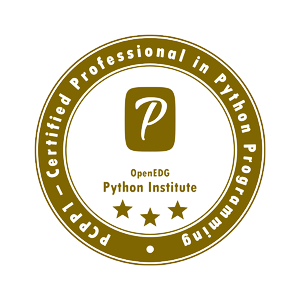Enrollment Python Institute Certifications
Certifications
Python Institute Certifications
 PCPP1™ – Certified Professional in Python Programming 1
(Exam PCPP-32-10x)
PCPP1™ – Certified Professional in Python Programming 1
(Exam PCPP-32-10x)
PCPP1™ – Certified Professional in Python Programming 1 certification is the first of the two-series General-Purpose Programming track professional credentials from the OpenEDG Python Institute addressed to developers, IT specialists, and working professionals looking to obtain an industry credential that documents their skills and expertise in the advanced and more specialized aspects of computer programming and the Python language.
| Exam name | PCPP1™ – Certified Professional in Python Programming 1 |
|---|---|
| Exam Code & Current Exam Versions | PCPP-32-101 (Status: Active) |
| Prerequisites | PCAP – Certified Associate in Python Programming (Exam PCAP-31-0x) |
| Validity | Lifetime |
| Exam Duration | PCEP-30-02 – Exam: 40 minutes, NDA/Tutorial: 5 minutes PCEP-30-01 – Exam: 45 minutes, NDA/Tutorial: 5 minutes |
| Number of Questions | 45 |
| Format | Single- and multiple-select questions | Python 3.x |
| Passing Score | 70% |
| Languages | English |
| Cost | USD 195 (Exam) |
| Delivery Channel | Pearson VUE: Authorized Pearson VUE Testing Centers + OnVUE Online Proctoring from Pearson VUE OpenEDG Testing Service: 2022 pilot, limited availability |
| Associated Certifications |
PCEP – Certified Entry-Level Python Programmer (Exam PCEP-30-0x) PCAP – Certified Associate in Python Programming (Exam PCAP-31-0x) PCPP2™ – Certified Professional in Python Programming 2 (Exam PCPP-32-20x) |
✱industry professionals wishing to explore technologies that are connected with Python, or that utilize it as a foundation;
✱team leaders, product managers, and project managers who want gain an in-depth understanding of the terminology and processes in the software development cycle to more effectively manage and communicate with production, QA, and development teams.